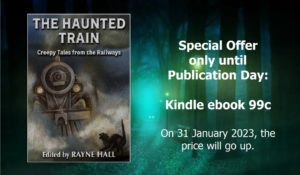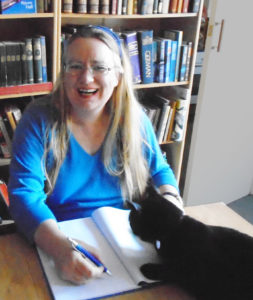Article written by Rayne Hall in celebration of The Haunted Train: Creepy Tales from the Railways
In real life, we seek to avoid fear, worry, panic, and terror. Yet in book form, they grant delicious thrills, and we choose to spend our time with the works of Edgar Allan Poe, Shirley Jackson, Stephen King, or Anne Rice.
As an author and reader of Gothic tales, I’ve identified seven psychological reasons why we’re drawn to scary tales:
1. ESCAPISM
Exciting stories distract us from the unpleasantness of real life. While reading, we become so absorbed that we forget about our everyday worries and looming threats. More than most other genres, Horror fiction offers excitement.
2. PERSPECTIVE
The suffering of fiction characters makes our own troubles seem less severe. Problems which normally drive us crazy—the arthritic twinge in a knee and the leaking roof suddenly seem minor inconveniences after we’ve spent time with characters who’ve had their legs ripped off and survived a snowstorm without shelter.
3. ADRENALINE RUSH
In dangerous situations, the brain releases a cocktail of adrenaline and other chemicals into the bloodstream to give us the stamina and courage needed to face the threat. These chemicals induce a high—a mild one for some people, a powerful surge for others. Horror fiction provides the same thrill as real danger, but in complete safety. The pleasure is similar to that of bungee-jumping, and it can be addictive.
4. EDUCATION
Horror stories teach valuable lessons about good and evil, about ethical conflicts and moral risks, about unseen dangers and disguised threats. Sharing the fictional characters’ adventures, we readers learn from their experiences, without making their mistakes and taking their risks. This is especially useful in stories for children—it gives kids the chance to learn without getting into danger—and for teenagers who may not heed parental warnings but like a scary story.
5. REASSURANCE
Many Horror stories—although not all—show that in the end, good triumphs over evil. Humans need that reassurance. In this respect, Horror stories are for adults what fairy tales are for children.
6. PERSONAL GROWTH
Story events put the fictional character’s strengths, resolution, ethics and courage to the test. As the character grows through experience, so does the reader. Dark stories invite readers to ask themselves what they would have done in the same situation, to compare the character’s courage with their own, to probe their consciences and explore their own ethics.
7. CONTROL
By reading, we gain control over our fears, at least temporarily. Whatever scares us, we can face this danger in fiction, reading as much or as little as we like, and are able to close the book when we’ve had enough. This sense of control can be empowering, especially for people who suffer from phobias and irrational fears.
WHAT DO YOU THINK?
What kind of horror fiction do you enjoy—creepy ghost stories, shocking tales of violence, extreme splatterpunk, disturbing fantasy yarns, or suspenseful Gothic tales? What draws you personally to Horror? Which of those seven reasons apply to you? Can you think of others?
Share your thoughts in the Comments below.
『••✎••』
Want to read some creepy stories but don’t know where to start? Find out if The Haunted Train: Creepy Tales from the Railways is the right fit for you by visiting Anna Faúndez’s book review. Or visit her blog to find new great books to read!
7 Reasons Readers Love Scary Stories was written in celebration of Rayne Hall’s upcoming short story collection featuring trains!
About the book The Haunted Train: Creepy Tales from the Railways
Come on board for a Gothic journey in a funicular railway in Victorian England, a freight train in the Carpathian mountains, a high tech sky train in Bangkok, an underground railway in Tokyo. Visit stations which lure with the promise of safe shelter but harbour unexpected dangers. Meet the people who work on the tracks—stationmasters, porters, signal-men—and those who travel—commuters, tourists, dead bodies, murderers, and ghosts.
In this volume, editor Rayne Hall has collected twenty of the finest—and creepiest—railway tales. The book features the works of established writers, classic authors and fresh voices. Some stories are spooky, some downright scary, while others pose a puzzling mystery.
Are you prepared to come on board this train? Already, the steam engine is huffing in impatience. Listen to the chuff-chuff-chuff from the locomotive and tarattata-tarattata of the giant wheels. Press your face against the dust-streaked window, inhale the smells of coal smoke and old textiles, watch the landscape whoosh past as you leave the familiar behind and journey into the unknown.
But be careful: you can’t know the train’s real destination, nor your fellow travellers’ intentions. Once you’ve closed that door behind you and the wheels start rolling, you may not be able to get out.
The ebook is available for pre-order from Amazon at the special offer price of 99 cents until 31 January 2023.
(After that date, the price will go up.)
The paperback edition will be available soon.
About Rayne Hall

Rayne Hall writes fantasy, horror, and non-fiction, and is the author of over 100 books. Her horror stories are more atmospheric than violent, and more creepy than gory, and often leans towards the Gothic, e.g The Bride’s Curse: Bulgarian Gothic Ghost and Horror Stories.
She is also the acclaimed editor of Gothic, Fantasy and Horror anthologies (e.g. Among the Headstones: Creepy Tales from the Graveyard, and Fiends: Ten Tales of Demons), and author of the bestselling Writer’s Craft series for advanced-level writers (including Writing Gothic Fiction, Writing Dark Stories, Writing Scary Scenes, Writing About Magic, Horror Writing Prompts, Writing About Villains, Writing Short Stories.)
Born and raised in Germany, Rayne Hall has lived in China, Mongolia, Nepal and Britain. Now she resides in a village Bulgaria. The country’s ancient Roman ruins and the deserted houses from Bulgaria’s communist period provide inspiration for creepy ghost and horror stories.
Her lucky black cat, Sulu, adopted from the cat rescue shelter, often accompanies her when she explores spooky derelict buildings. He delights in walking across shattered roof tiles, balancing on charred rafters and sniffing at long-abandoned hearths.
Rayne has worked as an investigative journalist, development aid worker, museum guide, apple picker, tarot reader, adult education teacher, belly dancer, magazine editor, publishing manager and more, and now writes full time.
Visit her on her website, her Facebook author page, on Mastodon (new) or Instagram (new), Subscribe to her newsletter here.
















